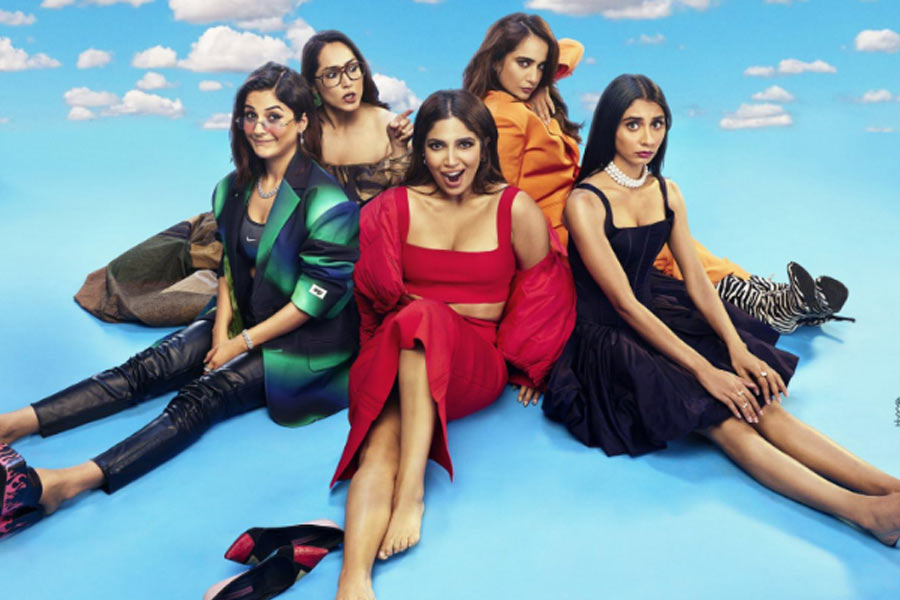It is always great when Bollywood tries its hand at talking about female desire and sexuality, whether it is a black comedy film like Lipstick Under My Burkha or a social drama like Parched, a slick OTT show like Four More Shots Please or a buddy comedy like Veere Di Wedding. Because they are few and far between. Good, bad, silly, they at least get the conversation started.
It is one of the reasons I went to watch Thank You for Coming, directed by Karan Boolani. With a title as bold and in-your-face as that, I expected a rip-roaring, raunchy ride, given that it is a film about a young woman’s search for the elusive orgasm, a reality for more than 60 percent of sexually active women.
But after sitting through 80 per cent of the film, where the main character goes through relationships looking for the right man who will give her an orgasm, and then when she finally has her big O moment after a drunken night at her own engagement party spends the rest of the time finding the man with whom she had that moment, you are told it is self-pleasure that is key. You don’t need a man for an orgasm, hallelujah!
Unfortunately, this epic discovery doesn’t work because then the audience has to believe in unicorns — 32-year-old women who have been sexually active since school who don’t know how to self-pleasure. Bhumi Pednekar’s character Kanika Kapoor, who has been raised by her gynaecolgist mother as a single parent, is open enough about her sexuality to bring boyfriends home but doesn’t know how to self-pleasure. Seriously?!
Kanika has two best friends — one divorced, one married — who get her sex toys as an engagement gift and talk about watching porn but never tell her ‘dude, what is this obsession you have about a man giving you an orgasm? Just do it yourself!’ The audience is expected to believe that none of the sexually active women in the world of Thank You For Coming indulge in self-pleasure. Why?
This brings me to my next beef with the film. Who is Kanika Kapoor other than an orgasm-chasing, binge-drinking 30-something woman? We are told she is a food blogger but we don’t see how her work defines her. Is she as much a loser at work as she is in relationships? Who are her best friends, when they are not partying with her or helping her find the man who gave her an orgasm? I mean our sexual desire is very much a part of who we are but it is not the only thing about us.
Also, it is worrying that Kanika keeps blacking out after binge drinking and none of her friends prevent her from drinking that much. Is having an orgasm for the first time more important than if you can remember if the sex was consensual? It is not a question of morality but one of safety. And it is laughable that a woman who needs to be rescued from the police because of a driving accident by the man she is engaged to screams ‘smash patriarchy’ on stage during an event at her alma mater.
This is not to say that everything about the film is problematic. I think Kanika’s mother, Beena Kapoor, is a great female character. She is the one smashing patriarchy every day. Whether it is deciding to not marry the sperm donor and bringing up her child out of wedlock to being unapologetic about her lifestyle both to neighbours and family members, she is truly a phenomenal woman.
The men in Thank You for Coming are also a mixed bag of characters but none are vilified, well apart from the horrible guy who was Kanika’s boyfriend in school. Her fiance is a traditionalist, in equal parts attracted to and puzzled by Kanika’s wildness. Her exes include a younger man played by Karan Kundrra and a much older, Gulzar-quoting player (Anil Kapoor is a riot in this role). Then there is Kanika’s friend Pallavi’s husband, a genuine guy who is not threatened to be the only man in a group of three close-knit women.
Unfortunately, the film tries to address too many issues and ends up making a shallow attempt at exploring each of them. So fun it might be, much thanks to a stellar turn by Pednekar, but impactful it definitely isn’t.











